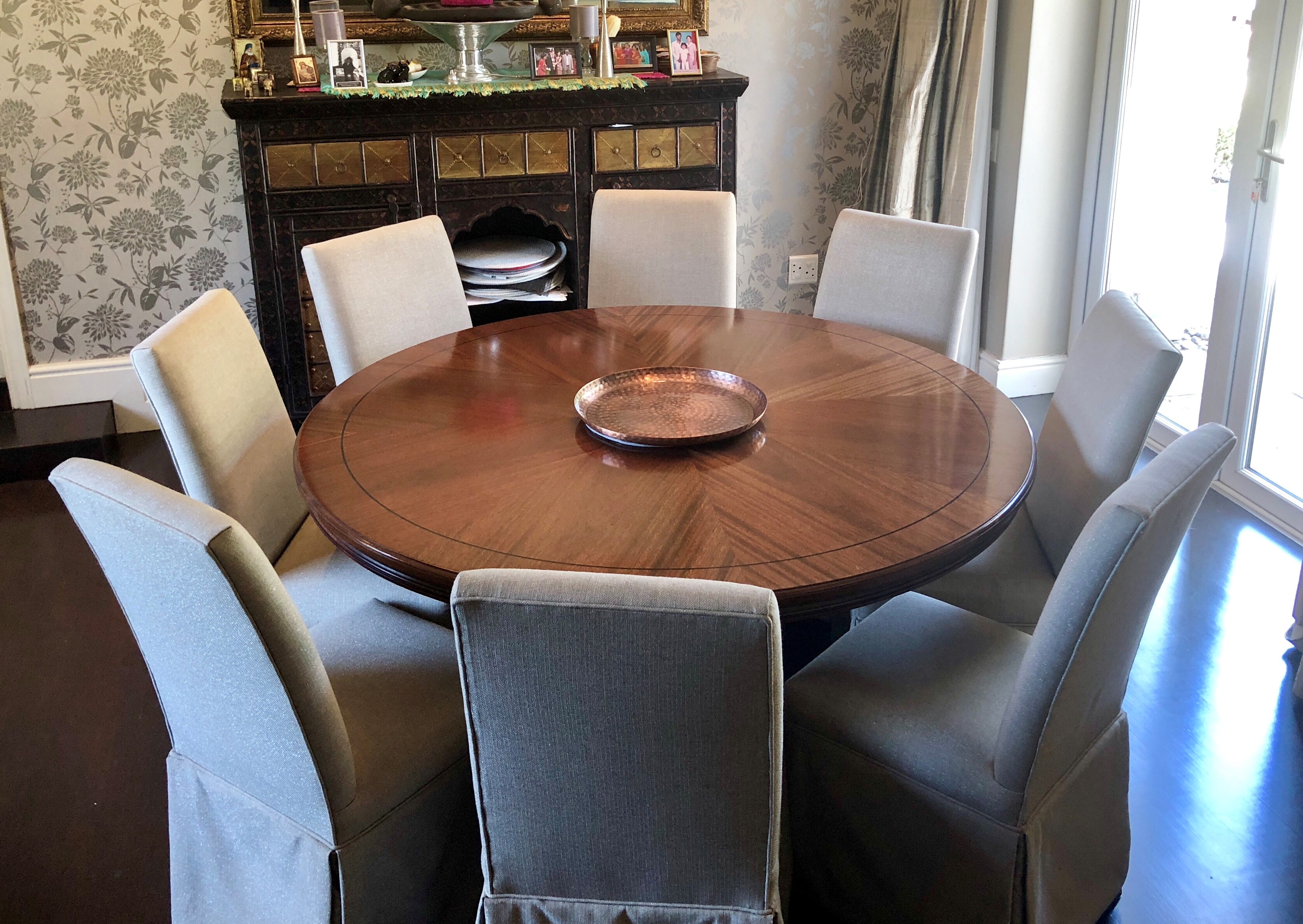We felt like conspiratorial knights by ordering a round dining room table: its handsome surface echoed the inlaid grain and gleam of a Louis XV replica, painstakingly crafted but modernized sans the Rococo flamboyance. A good table to lay a feast upon. It seated eight.
By our furniture choices, we had transcended the confines of our joint lower-middle class upbringings. The table’s custom-made chairs were upholstered with faint golden threads and skirts that primly reached the mahogany-stained wood floors. A chandelier, heavy with crystals, hovered overhead; a gilded mirror reflected the cozy setting, looming over an ornate Rajasthani server decked with towering silver candlestick holders.
But soon, we realized that eight seats were too few for a dinner party and so a pressing game of hopscotch ensued: the inevitable last-minute cancellations—so Cape Town!—would be balanced by the friend who’d bring a new partner unannounced, or two extra “please, if you don’t mind” guests. Over time, I began to understand what I’d known in theory: a nice home wouldn’t guarantee a full table.
Sometimes life withholds the seating plan. And the table lies bare.
With long stretches of time away working abroad, the table became a roadmap navigating us safely towards domestic comforts. It was to mean that I was cooking in the large, modern kitchen I’d helped build; I was to be surrounded by laughter and camaraderie. It was supposed to be a space to entertain, share recipes learned in Galilee or Greenland on tableware collected on these faraway journeys and to commune with an ever-dwindling, but tight circle of tablemates.
But friends’ newborns shifted priorities; promotions beckoned, whisking some to cities across the country, or oceans; too many birthdays and monthly drinks dates missed made the silences that much more awkward. Politics found a seat at the table, and not without casualties. Feigned insouciance meant no one laid bare their gut-wrenching fears or dirty confessions, the table talk that binds people for life.
It’s true what they say: post-college friendship renewals are agonizing; the new sign-ups as lofty as Ivy League aspirations. And we were tired much of the time, from packing and unpacking our suitcase-bound lives. For a decade, when the last guests left around 1 AM, we joked, gathering wine bottles for recycling, that everyone had changed in some way, except us. Give or take ten kilograms, we remained the same, we smirked idiotically.
The table provided a surface to give thanks, to feel ensconced in familiarity.
Then one day, a call arrived to return home urgently. Pieces of a year-long puzzle that had stumped us, fell into stark, disturbing relief. We returned with my mother, who had lost almost half her body weight in six months; and we left my bewildered, aging father behind. The days became paved with a nightmarish dystopia, as if the poems of Edgar Allen Poe had cleaved our reality. I covered the table in a somber white cloth purchased in Cuba two years prior.
I had no feedback to give to the questions and concern, nothing etched in science or sense. We were doing okay, thank you. Friends stopped asking. And invitations to other tables shriveled over time.
Perhaps they imagined I was still away (“You’re never here!” I’d heard so often). Projecting, I thought of Winona LaDuke, the Native American environmental activist, who said: “I am tired of being invisible to you all.” I felt small and petty for feeling abandoned. I thought of American Thanksgiving tables, groaning with an excess of turkey (to brine, or not?) and gloopy vegetables; the goodwill of friends and extended families; laughter, a little too shrill, the punch line sucking the oxygen out of the room.
And I thought of our table.
That lavish purchase, hand-crafted over six months, empty now, except for the faint scratches from countless parties, and the watermark that seeped in when a too-full vase of St Joseph’s lilies toppled over one night. It left me wondering if I, truthfully, hadn’t changed at all in the last decade. Why had I been so reluctant to grasp the gradual, but seismic shifts happening around me?
What I can say with conviction is that, in suburbia, eight seats on a table are far too few. Until the day the table is too large.
Ishay Govender-Ypma





